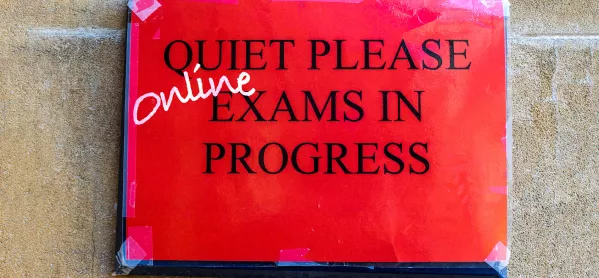AQA plans for digital GCSE exams from 2026

AQA has set out its first steps towards digital exams, with GCSEs potentially moving online from 2026.
The exam board has proposed that the reading and listening components of GCSE Italian and Polish should be the first to be sat digitally - with digital mocks from 2025, followed by exams from 2026 if regulators approve the plan.
AQA then hopes students will be able to sit digital exams for a major subject by 2030.
It is not the first exam board to run digital exams: Pearson Edexcel ran a trial for the English language iGCSE last year in a big step for the rollout of digital exams.
Pearson reported the pilot was a success. Feedback from school leaders was that there had been some software problems, but the concept was popular with students.
Today, AQA has put forward the case for digital exams in a report drawing from a poll of parents, Sendcos and students, as well as pilot findings.
- Sunak’s A-level plan drawn up on ‘back of envelope’
- Advanced British Standard: everything you need to know
- Maths to 18: Call for universal ‘on-demand’ assessment
The report lays out how AQA believes digital exams will help with teacher workload in the long term. For example, digital formative assessments could give teachers an idea of students’ progress and be marked automatically, it says.
The move could also allow exams to be more adaptable and inclusive, help develop digital skills, and also be more environmentally sustainable, AQA concludes.
Overall, “many” teachers felt positively about digital exams, AQA found.
Of the young people surveyed, 63 per cent said they would be comfortable using a computer for longer than an hour, compared with only 36 per cent saying the same for pen and paper.
There was a particularly positive response about the idea of more digital exams for children with special educational needs and disabilities, or hearing or visual impairments.
AQA pilots found that digital assessment meant exams could be more interactive - students could more easily edit their answers in essay-based exams and the interactive format worked well with things like graphs.
Exam scripts would also not need to be stored and sent to markers if carried out digitally, potentially speeding up the time results take to come out.
Move to digital exams
Tom Middlehurst, assessment specialist at the Association of School and College Leaders, welcomed the development, saying the current exam system was “becoming increasingly outdated”.
He said: “Developments in technology provide opportunities to refine our approach to one that is less burdensome yet more in keeping with the modern, digital world and the skills young people are going to need.
“Digital exams will also support more adaptive, personalised approaches to assessment to enable all children to show what they can do.”
But Mr Middlehurst cautioned that a move to digital exams would need proper investment in technology to ensure students without device access were not disadvantaged.
AQA’s report also flagged the need for capital investment and training, as well as constant monitoring, to ensure digital exams do not widen the attainment gap.
Small steps
Writing exclusively for Tes today, AQA CEO Colin Hughes said changing the format of exams “cannot, and should not, happen overnight”.
“We intend to roll out digital exams over a period of years, learning along the way, taking small steps at first and bigger steps as we go along,” he added.
The exam board has said it will announce more detailed plans after a consultation period next year.
You need a Tes subscription to read this article
Subscribe now to read this article and get other subscriber-only content:
- Unlimited access to all Tes magazine content
- Exclusive subscriber-only stories
- Award-winning email newsletters
Already a subscriber? Log in
You need a subscription to read this article
Subscribe now to read this article and get other subscriber-only content, including:
- Unlimited access to all Tes magazine content
- Exclusive subscriber-only stories
- Award-winning email newsletters
topics in this article



